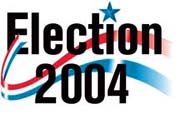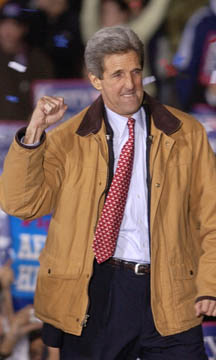

|
Frenzied race hinges
on today's turnout
The presidential drive ends with
talk of a record-setting vote
President Bush and Sen. John Kerry reached for the finish line today in a campaign for the ages, each claiming to be the strong, steady leader needed in a time of terrorism. "The world is watching," said the Democratic challenger in a race that defied safe prediction.
"This election comes down to who do you trust," Bush said as Air Force One carried him to a half-dozen states on a final full day of campaigning.
Kerry made six stops in four states yesterday -- two each in Ohio and Wisconsin -- pledging to be an advocate for the middle class and those struggling to join it. "I've heard your struggles. I share your hopes. And together, tomorrow we have a chance to make a difference," he said, casting Bush as a friend of the rich and powerful.
By election eve, uncounted millions of Americans had voted early in 32 states, including more than 1.8 million in Florida alone. Both campaigns primed Election Day turnout programs in battleground states from New Hampshire to Nevada.
After nearly eight months of head-to-head campaigning between the president and the Massachusetts senator, the final pre-election polls turned up tied -- 49-49 in one CNN-USA Today-Gallup survey, with Ralph Nader at 1 percent. Tight surveys in Florida as well as Ohio and other Midwestern states added to the uncertainty of the competition for 270 electoral votes.
|
|
Both rivals campaigned well into the wee hours this morning -- Bush in Dallas, Kerry in La Crosse, Wis.
With the excitement of the campaign at a fever pitch and voters so polarized that there was almost no one left to convert, nonpartisan election experts said that as many as 121 million Americans might vote, eclipsing the record of 106 million ballots cast four years ago. And with the race too close to call, the winner is likely to be the side best able to muster its core supporters, party strategists agreed.
On the last day of his two-year campaign for the presidency, Kerry dashed from Florida to Wisconsin and across the Great Lakes to Michigan and Ohio, basking in the glow of enthusiastic crowds. Bush, fighting to hold onto the White House, also campaigned across the nation, logging 2,548 miles before heading to his Texas ranch.
As the match went down to the wire, the volunteer armies in Ohio, Florida, Pennsylvania, Michigan and other swing states pounded on doors, rang telephones, stuffed computers and mailboxes and arranged Election Day enticements: free day care for parents, free rides to polling places for elderly or disabled voters, free cookies, tacos, T-shirts and admissions to swimming pools. Even free underwear.
Many employers are giving workers time off to vote; one in New York is offering employees an extra vacation day as a reward for voting. A Pennsylvania professor is giving students extra credit for casting a ballot. If it rains in Cleveland today, volunteers will stand in lines with umbrellas and ponchos to keep voters dry.
Nationally, the Democrats and the Republicans each claimed to have 1 million volunteers in the campaign. Democrats said they had made 23.5 million calls and knocked on 8 million doors for Kerry. Republicans said they had contacted 18 million voters. The numbers were impossible to verify, but there was no doubt they were huge. Voters were besieged by recorded calls from candidates, their wives or star supporters. Many voters were contacted by both sides, sometimes only minutes apart.
U.S. judges OK voting challenges
in key state Ohio
CINCINNATI » A federal appeals court has cleared the way for challengers to be present at polling places in Ohio, ruling early today that their presence on Election Day is allowed under state law.A three-judge panel of the 6th U.S. Circuit Court of Appeals ruled 2-1 to grant emergency stays of two federal judges' orders yesterday that barred political parties' voter challengers in Ohio. The judges also consolidated the two cases.
The court said that while there is a strong public interest in letting registered voters vote freely, there is also "strong public interest in permitting legitimate statutory processes to operate to preclude voting by those who are not entitled to vote."
The dissent said the citizens of Ohio have the right to vote without the "threat of suppression, intimidation or chaos sown by partisan political operatives."
Republicans wanted to put challengers in many polling places because of concerns about fraud with hundreds of thousands of newly registered voters in a state President Bush and Sen. John Kerry both say they need to win. Democrats have accused the GOP of trying to suppress Democratic turnout.


